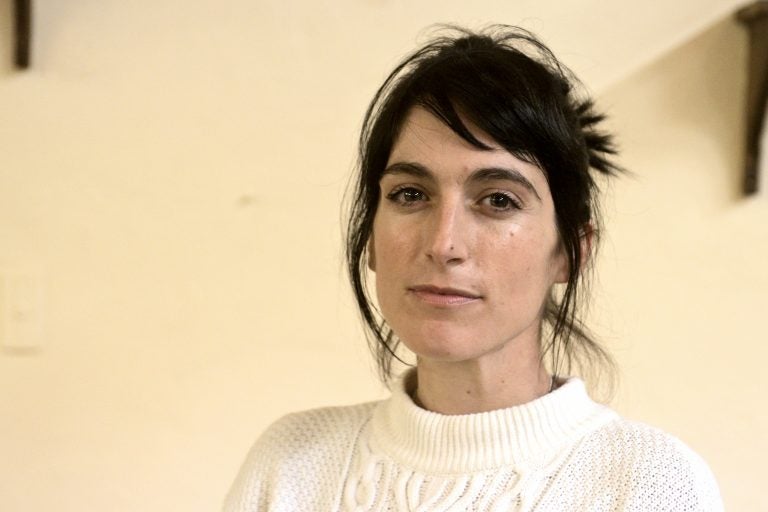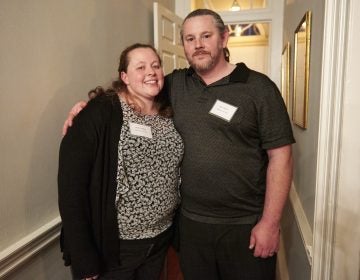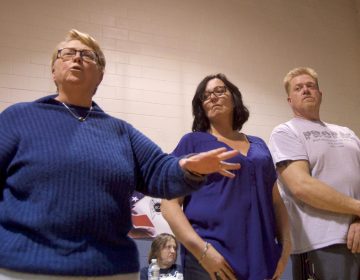Safehouse hires leader to open Philly’s supervised injection site
Safehouse, the Philadelphia nonprofit planning to open what may be the country’s first supervised injection site, has hired an executive director.

Jeanette Bowles is the new executive director of Safehouse, an overdose prevention organization in Philadelphia. (Bastiaan Slabbers for WHYY)
Safehouse, a Philadelphia nonprofit planning to open what may be the country’s first supervised injection site, has hired an executive director. It’s a significant development as the group hopes to launch a facility this year where people can use illegal drugs such as heroin and other opioids under medical supervision.
Jeanette Bowles, 36, who earned her doctorate in public health from Drexel University and has done extensive field work studying the opioid crisis in Kensington, will lead the group as it continues to engage with community members, raise money and scout a site for the opening of what advocates call an overdose prevention site.
“I believe in it so much,” Bowles said. “We see this working in other places, and the evidence supports it so strongly. We don’t have progress in public health without some controversy and scrutiny accompanying it.”
Opioid-related drug overdoses killed an estimated 1,100 people in Philadelphia last year, marking the city’s first decline in overdose deaths in five years. However public health experts still consider overdose deaths to be at crisis levels — three times the city’s murder rate.
In response, city officials have equipped droves of paramedics, police officers and SEPTA workers with the overdose-reversing drug nalaxone, also known by the brand name Narcan; they’ve credited that with helping stabilize the fatal overdose rate. Officials also have cleared heroin encampments and tried to connect those evicted from those areas with services. The opening of an emergency operations center in Kensington, considered the heart of the crisis, has boosted that effort.
Those doing the outreach work see opening a facility where people can use heroin and other drugs under the guidance of medical staff as part of a larger strategy; it’s also sparked controversy and opposition. No such site operates in the United States, but the model has been shown to save lives in Canada and parts of Europe.
“This isn’t just about providing an overdose prevention site,” Bowles said. “It also includes access points to treatment, access points to medical care, access points to housing services.”
‘Important step for the city’
The board of Safehouse, which incorporated as a nonprofit last year, includes Jose Benitez, who runs a needle exchange program at Prevention Point; Ronda Goldfein of the AIDS Law Project of Pennsylvania; and former Pennsylvania Gov. Ed Rendell.
In October, Rendell said federal officials can “come and arrest me first” in the face of threats from federal law enforcement officials that Safehouse would run afoul of so-called crackhouse laws that forbid facilities from housing the use of controlled substances.
Goldfein said Wednesday that an additional board member will soon be joining Safehouse, but she would not elaborate.
Top U.S. Department of Justice officials have told WHYY that if the city opens such a facility, the federal crackdown will be swift and aggressive.
Bowles will now be an important leading voice in developing how Safehouse plans to deal a federal crackdown and prosecution. But on Wednesday, she would not comment on the nonprofit’s legal strategy.
“I’ve joined the team that respectfully disagrees with the Justice Department,” Bowles said.
At a a town hall meeting Wednesday night in Port Richmond at the Mother of Divine Grace Church, she will be part of a group responding to community concerns and questions over the planned supervised injection site.
Despite her position as executive director, the longtime harm reduction activist said she will frequently hit the streets to make connections with the community around Kensington.
“Wanting to build trusting relationships with community members. That’s really paramount,” Bowles said. “Sitting in the office and doing the work separate from the community has never been my approach or style. Being embedded with the community and developing those relationships and having my feet on the ground has always been most important to me.
“That’s how the best public health work is done, through building bridges with community members.”
Recently, Bowles completed postdoctoral work at the University of California in San Diego. She earned a bachelor’s degree from Temple University before moving to the University of Pennsylvania where she obtained a master’s degree in social work. Her dissertation at Drexel focused on responses to opioid overdoses in Kensington.
Bowles’ research has also taken her to the South Bronx and Puerto Rico. But she sees leading Safehouse as a homecoming of sorts.
“I’m happy to return to Philadelphia to be a part of this,” Bowles said. “This is an important step for the city to take.”
WHYY is your source for fact-based, in-depth journalism and information. As a nonprofit organization, we rely on financial support from readers like you. Please give today.




